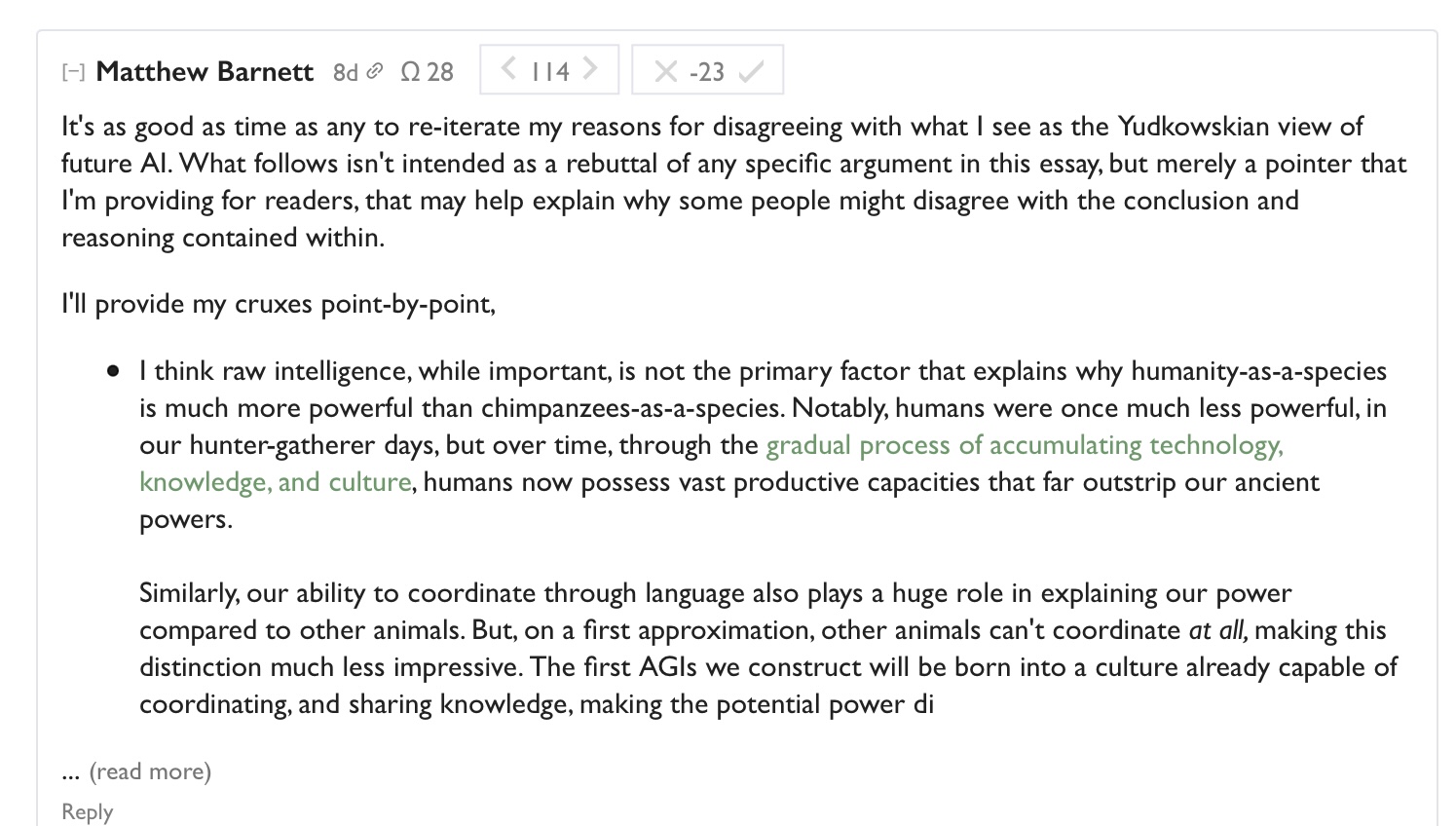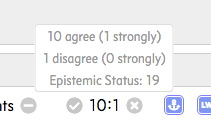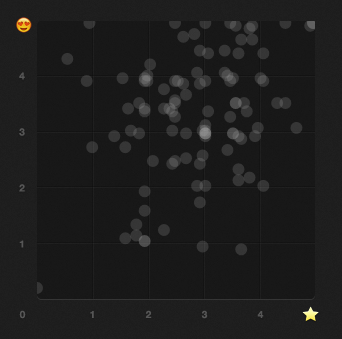Starting today we're activating two-factor voting on all new comment threads.
Now there are two axes on which you can vote on comments: the standard karma axis remains on the left, and the new axis on the right lets you show much you agree or disagree with the content of a comment.

How the system works
For the pre-existing voting system, the most common interpretation of up/down-voting is "Do I want to see more or less of this content on the site?" As an item gets more/less votes, the item changes in visibility, and the karma-weighting of the author is eventually changed as well.
Agree/disagree is just added on to this system. Here's how it all hooks up.
- Agree/disagree voting does not translate into a user's or post's karma — its sole function is to communicate agreement/disagreement. It has no other direct effects on the site or content visibility (i.e. no effect on sorting algorithms).
- For both regular voting and the new agree/disagree voting, you have the ability to normal-strength vote and strong-vote. Click once for normal-strength vote. For strong-vote, click-and-hold on desktop or double-tap on mobile. The weight of your strong-vote is approximately proportional to your karma on a log-scale (exact numbers here).
Ben's personal reasons for being excited about this split
Here's a couple of reasons that are alive for me.
- I personally feel much more comfortable upvoting good comments that I disagree with or whose truth value I am highly uncertain about, because I don’t feel that my vote will be mistaken as setting the social reality of what is true.
- I also feel very comfortable strong-agreeing with things while not up/downvoting on them, so as to indicate which side of an argument seems true to me without my voting being read as “this person gets to keep accruing more and more social status for just repeating a common position at length”.
- Similarly to the first bullet, I think that many writers have interesting and valuable ideas but whose truth-value I am quite unsure about or even disagree with. This split allows voters to repeatedly signal that a given writer's comments are of high value, without building a false-consensus that LessWrong has high confidence that the ideas are true. (For example, many people have incompatible but valuable ideas about how AGI development will go, and I want authors to get lots of karma and visibility for excellent contributions without this ambiguity.)
- There are many comments I think are bad but am averse to downvoting, because I feel that it is ambiguous whether the person is being downvoted because everyone thinks their take is unfashionable or whether it's because the person is wasting the commons with their behavior (e.g. belittling, starting bravery debates, not doing basic reading comprehension, etc). With this split I feel more comfortable downvoting bad comments without worrying that everyone else who states the position will worry if they'll also be downvoted.
- I have seen some comments that previously would have been "downvoted to hell" are now on positive karma, and are instead "disagreed to hell". I won't point them out to avoid focusing on individuals, but this seems like an obvious improvement in communication ability.
I could go on but I'll stop here.
Please give us feedback
This is one of the main voting experiments we've tried on the site (here's the other one). We may try more changes and improvement in the future. Please let us know about your experience with this new voting axis, especially in the next 1-2 weeks.
If you find it concerning/invigorating/confusing/clarifying/other, we'd like to know about it. Comment on this post with feedback and I'll give you an upvote (and maybe others will give you an agree-vote!) or let us know in the intercom button in the bottom right of the screen.
We've rolled it out on many (15+) threads now (example), and my impression is that it's worked as hoped and allowed for better communication about the truth.

appreciation for high-quality comments that many users disagree with.





I'm sad this is your experience!
I interpret "agree/disagree" in this context as literally 'is this comment true, as far as you can tell, or is it false?', so when I imagine changing it to "true/false" I don't imagine it feeling any different to me. (Which also means I'm not personally opposed to such a change. 🤷)
Maybe relevant that I'm used to Arbital's 'assign a probability to this claim' feature. I just tihnk of this as a more coarse-grained, fast version of Arbital's tool for assigning probabilities to claims.
When I see disagree-votes on my comments, I think I typically feel bad about it if it's also downvoted (often some flavor of 'nooo you're not fully understanding a thing I was trying to communicate!'), but happy about it if it's upvoted. Something like:
Possibly I was primed to interpret things this way by Arbital? On Arbital, probability assignments get their own page you can click through to; and Arbital pages are timeless, so people often go visit a page and vote on years after the post was originally created, with (I think?) no expectation the post author will ever see that they voted. And their names and specific probabilities are attached. All of which creates a sense of 'this isn't a response to the post, it's just a tool for people to keep track of what they think of things'
Maybe that's the crux? I might be totally wrong, but I imagine you seeing a disagree-vote and reading it instead as 'a normal downvote, but with a false pretension of being somehow unusually Epistemic and Virtuous', or as an attempt to manipulate social reality and say 'we, the elite members of the Community of Rationality, heirs to the throne of LessWrong, hereby decree (from behind our veil of anonymity) (with zero accountability or argumentation) that your view is False; thus do we bindingly affirm the Consensus Position of this site'.
I think I can also better understand your perspective (though again, correct me if I'm wrong) if I imagine I'm in hostile territory surrounded by enemies.
Like, maybe you imagine five people stalking you around LW downvoting-and-disagreevoting on everything your post, unfairly strawmanning you, etc.; and then there's a separate population of LWers who are more fair-minded and slower to rush to judgment.
But if the latter group of people tends to upvote you and humbly abstain from (dis)agreevoting, then the pattern we'll often see is 'you're being upvoted and disagreed with', as though the latter fair-minded population were doing both the upvoting and the disagreevoting. (Or as though the site as a whole were virtuously doing the support-and-defend-people's-right-to-say-unpopular-things thing.) Which is in fact wildly different from a world where the fair-minded people are neutral or positive about the truth-value of your comments, while the Duncan-hounding trolls.
And even if the probability of the 'Duncan-hounding trolls' thing is low, it's maddening to have so much uncertainty about which of those scenarios (or other scenarios) is occurring. And it's doubly maddening to have to worry that third parties might assign unduly low probability to the 'Duncan-hounding trolls' thing, and to related scenarios. And that they might prematurely discount Duncan's view, or be inclined to strawman it, after seeing a -8 or whatever that tells them 'social reality is that this comment is Wrong'.
Again, tell me if this is all totally off-base. This is me story-telling so you can correct my models; I don't have a crystal ball. But that's an example of a scenario where I'd feel way more anxious about the new system, and where I'd feel very happy to have a way of telling how many people are agreeing and upvoting, versus agreeing and downvoting, versus disagreeing and upvoting, versus disagreeing and downvoting.
Plausibly a big part of why we feel differently about the system is that you've had lots of negative experiences on LW and don't trust the consensus here, while I feel more OK about it?
Like, I don't think LW is reliably correct, and I don't think of 'people who use LW' as the great-at-epistemics core of the rationalescent community. But I feel fine about the site, and able to advocate my views, be heard about, persuade people, etc. If your experience is instead one of constantly having to struggle to be understood at all, fighting your way to not be strawmanned, having a minority position that's constantly under siege, etc., then I could imagine having a totally different experience.